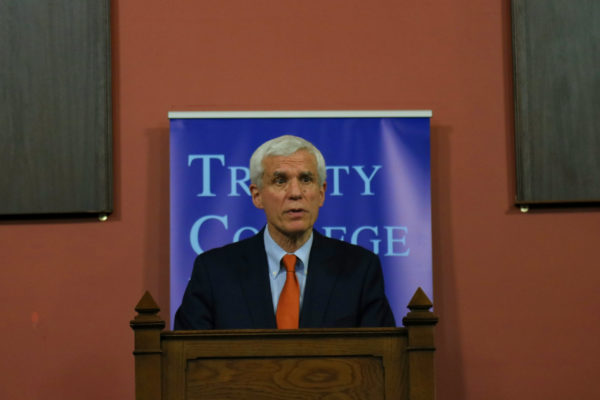
As part of the Trinity College Law Review’s Distinguished Speaker series, Prof David Bruck – an American criminal defence attorney and a lecturer in Washington and Lee University – visited the College this week to present a discussion entitled “Democracy and Cruelty: A US Capital Defender’s Perspective on Why Americans Punish so Much”.
Bruck, a strong opponent of the death penalty in America, has been campaigning for an end to the practice for the past 38 years. He has represented a number of high-profile defendants, including Dzhokhar Tsarnaev, suspected of carrying out the bombing of the Boston Marathon, as well as Charleston church shooter Dylann Roof.
Bruck was a notably engaging speaker, provocatively pointing out the harsh realities of the inequalities that underpin the American death penalty. The conservative counter-revolution in the US, Bruck said, was a reality check to him and his peers, who mistakenly thought that the great social achievements of the mid-20th century in the US were inalienable.
Bruck made the point that the accelerated rate of incarcerations in the 1960s and 1970s had nothing to do with a rise in crime, but instead came about because of a rise in the politicisation of crime.
One key piece of advice Bruck offered to those studying law was to “go to a place where no one agrees with you”. That, he insisted, is where you’ll have the biggest impact. When he began practicing law in South Carolina as a public defender in 1976, the vast majority of the population there agreed with the death penalty. Lawyers hired to defend men on death row were often paid a maximum of $750, and as a result cared little about the outcome of the trial. Defendants, then, were not being properly represented – which is where Bruck stepped in.
As for the space for emotion in the law, Bruck was clear that you become “less sentimental when you see the horrible things people do”. But it is the manner in which executions are carried out in states such as South Carolina that Bruck condemns. For every 1,000 convicted criminals in South Carolina, he said, 200 would be sentenced to death, 20 or 30 would make it to trial, 10 would be put on death row and maybe five would actually be executed. And for those five, their execution would be the consequence of bad luck. Racism and poverty also play a big role in choosing who is executed, Bruck explained.
A short questions and answers session followed his presentation, which featured an interesting query about why the world does not condemn the death penalty in the US. Bruck said criticism is beginning to grow louder, with many Europe-based pharmaceutical companies refusing to ship the drugs required for the lethal injection. However, he said that there is “no sense of equality in US history”, which he said explains the resistance in some parts of America to the abolition of the death penalty. In the end, Bruck said, he is nevertheless optimistic that the day will come when the death penalty is no more.






